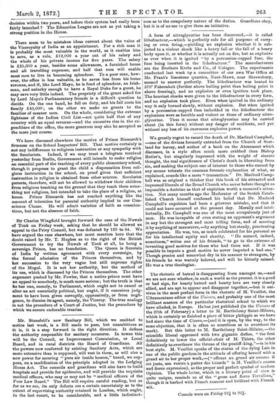We greatly regret to record the death of Dr. Macleod
Campbell, —one of the divines formerly extruded from the Church of Scot- land for heresy, and author of a book on the Atonement which discusses, in a style often much more crabbed than Bishop Butler's, but singularly impressed with the weight of sincere thought, the real significance of Christ's death in liberating from sin, and making the subject one of interest to those who cannot by any means tolerate the common forensic explanation of what, so explained, sounds like a mere "transaction." Dr. Macleod Camp- bell was so original a thinker that this book of his attracted and impressed liberals of the Broad Church who never before thought so impossible a doctrine as that of expiation worth a moment's atten- tion. Not many months ago the Moderator of the Scotch Estab- lished Church himself confessed his belief that Dr. Macleod Campbell's expulsion had been a grievous mistake, and that it could not have occurred at the present day. Morally and intel- lectually, Dr. Campbell was one of the most scrupulously just of men. He was incapable of even stating an opponent's argument in any but the strongest and most telling form, and of meeting it by anything of manceuvre,—by anything but steady, penetrating appreciation. Ile was, too, as much celebrated for his personal as for his intellectual equity and charity. "lie seemed, indeed, sometimes," writes one of his friends, "to go to the extreme of inventing good motives for those who had them not. If it was possible to impute a good motive he never imputed a bad one." Though precise and somewhat dry in his manner to strangers, by his friends he was warmly beloved, and will be bitterly missed. He was a true theologian.


































 Previous page
Previous page